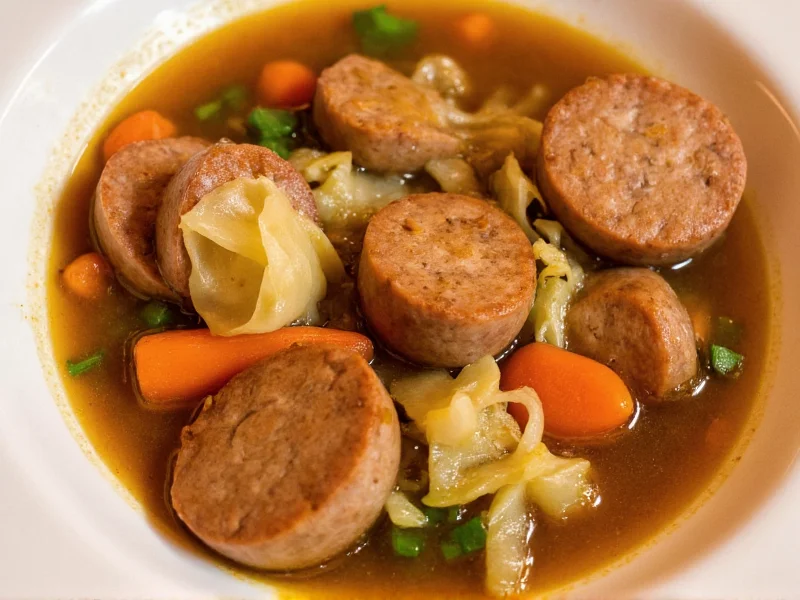Sausage cabbage soup represents a beloved culinary tradition across Eastern Europe, particularly in Polish, German, and Ukrainian kitchens. This humble yet satisfying dish transforms basic pantry staples into a nourishing meal that has sustained families through harsh winters for generations. Unlike trendy fad diets, authentic sausage cabbage soup provides complete nutrition while delivering deep, complex flavors through proper technique.
Essential Ingredients and Their Purpose
Creating exceptional sausage cabbage soup requires understanding each component's role. While regional variations exist, these core ingredients form the foundation:
| Ingredient | Function | Quality Indicator |
|---|---|---|
| Smoked sausage | Provides protein and smoky depth | Firm texture, visible meat grains, no liquid pooling |
| Green cabbage | Adds sweetness and texture variation | Firm head, crisp leaves, no yellowing |
| Yellow onion | Creates flavor base | Firm, dry outer skin, no sprouting |
| Carrots | Contributes natural sweetness | Bright orange, firm, smooth skin |
| Chicken broth | Forms flavorful cooking liquid | Rich aroma, gelatinous when chilled |
Step-by-Step Preparation Guide
Follow these professional techniques for restaurant-quality sausage cabbage soup every time. The key to developing deep flavor lies in proper ingredient sequencing and cooking times.
Preparation Phase
Begin by slicing 1 pound of smoked kielbasa into 1/4-inch rounds. Chop 1 large yellow onion and 2 carrots into uniform 1/4-inch pieces. Remove the tough outer leaves from a medium green cabbage, then shred 6 cups using a sharp knife or mandoline. Properly cut ingredients ensure even cooking and optimal texture.
Cooking Sequence
Heat 1 tablespoon of olive oil in a heavy-bottomed pot over medium heat. Add the sausage and cook until browned on both sides, about 5 minutes. Remove sausage and set aside. In the same pot, sauté onions and carrots until translucent (7-8 minutes). This builds the flavor foundation without burning the meat.
Add the shredded cabbage and 4 cups of quality chicken broth. Bring to a gentle boil, then reduce heat to low. Return the sausage to the pot. Cover and simmer for 25-30 minutes until cabbage reaches your preferred tenderness. Stir occasionally to prevent sticking.
Regional Variations Worth Trying
Authentic sausage cabbage soup adapts beautifully to different culinary traditions and dietary needs. These tested variations maintain the dish's essence while offering new flavor experiences:
- Polish-style kapuś z kiełbasą: Add 1 diced tomato and 1 teaspoon caraway seeds during the last 15 minutes of cooking. Finish with fresh dill.
- German variations: Substitute smoked pork sausage and add 2 bay leaves plus 1/2 cup sauerkraut during the final simmer.
- Quick weeknight sausage cabbage soup: Use pre-shredded cabbage and quality canned broth to reduce prep time to 20 minutes.
- Vegetarian adaptation: Replace sausage with smoked tofu and use vegetable broth. Add 1 tablespoon liquid smoke for authentic flavor.
Critical Cooking Techniques for Success
Avoid common mistakes that ruin otherwise promising sausage cabbage soup. Professional chefs emphasize these crucial techniques:
Never boil cabbage vigorously, as this creates unpleasant sulfur compounds. Maintain a gentle simmer after the initial boil. Add acid like lemon juice or vinegar only at the end of cooking to preserve cabbage's bright color. When using pre-cooked sausage, avoid overcooking which makes it tough and rubbery.
For deeper flavor in your easy sausage cabbage soup recipe, brown the sausage thoroughly before removing it from the pot. This creates fond (browned bits) that forms the flavor base when deglazed with broth. Properly executed, this technique transforms simple ingredients into a complex, restaurant-quality dish.
Nutritional Profile and Health Benefits
Authentic sausage cabbage soup delivers balanced nutrition when prepared with quality ingredients. A standard serving (1.5 cups) typically contains:
- Approximately 350 calories
- 22g protein from quality sausage
- 15g dietary fiber from cabbage
- Over 100% of daily vitamin C needs
- Significant vitamin K and B vitamins
The combination of lean protein and high-fiber vegetables creates a satiating meal that supports healthy digestion. Cabbage contains glucosinolates, compounds studied for their potential anti-inflammatory properties. When selecting sausage, choose varieties with minimal fillers and preservatives for the healthiest sausage cabbage soup.
Serving and Storage Recommendations
For optimal flavor development, let sausage cabbage soup rest for 15-20 minutes before serving. This allows flavors to meld while the cabbage continues softening slightly. Serve hot with crusty bread for dipping. A squeeze of fresh lemon juice just before eating brightens the flavors beautifully.
Store leftovers in airtight containers in the refrigerator for up to 4 days. The soup actually improves in flavor after 24 hours as ingredients continue marrying. Freeze portions for up to 3 months. When reheating, add a splash of broth or water as cabbage absorbs liquid during storage.
Perfecting Your Sausage Selection
The best sausage for cabbage soup provides smoky depth without overwhelming saltiness. Traditional Polish kielbasa offers authentic flavor, while German bratwurst creates a milder version. For quick weeknight sausage cabbage soup, quality pre-cooked smoked sausage works well.
Avoid sausages with excessive fillers or artificial smoke flavor. Check labels for recognizable ingredients - the best options list meat, salt, garlic, and natural smoke as primary components. When possible, visit a local butcher for freshly made sausage with superior texture and flavor compared to mass-produced varieties.











 浙公网安备
33010002000092号
浙公网安备
33010002000092号 浙B2-20120091-4
浙B2-20120091-4